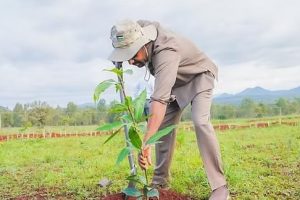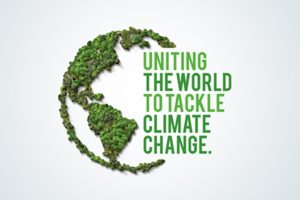Climate change has continued its catastrophic moves against Africa. Floods affect over a million people, rivers lost their water volume, frequent drought, the worst locust outbreak in the Horn of Africa that was caused by unusual weather conditions, left about one million people food insecure in the region.
Climate change also negatively impacts the GDP of African countries. Studies and reports have shown that Africa, in the long term, could see its GDP decrease by up to 30 by the year 2050 due to climate change. Because climate change dramatically touches every human activity, especially the livelihood of the people.
Scholars in the field noted that GDP can be measured in three ways: Output: the total value of the goods and services produced by all sectors of the economy that includes agriculture, manufacturing, energy, construction, the service sector, and government. Expenditure: The value of goods and services bought by households and by government, investment in machinery and buildings – this also includes the value of exports, minus imports. Income: The value of the income generated, mostly in terms of profits and wages.
However, various factors affect the country’s GDP, non-marketed activities, underground economy, quality of life, poverty, and economic inequality, but environmental quality, and resource depletion have become a severe problem these days.
Environmental factors create a huge challenge for the economy of the country since any economic activity is highly dependent on environmental factors, such as weather conditions and climate change. It also negatively impacts the lifestyle of the people. For instance, customers will spend and save less money during extended periods of bad weather, rise in the prices of consumers’ goods and other commodities. Any changes in the availability of natural resources will impact the economy and hence, the GDP.
Climate change, rising unemployment rates, inflation, trade balance changes, and falling real wages play a role, too. Each of these factors can negatively affect the GDP of a nation, leading to a loss of revenue for businesses, enterprises, and so on.
The recent UN Framework Convention on Climate Change (UNFCCC) report analyzed the updated climate action plans from 75 nations and found that the policies stated will not come close to the Paris Agreement goals.
Hence climate, in Africa, has economic consequences. African countries with challenging fiscal positions and high debt levels can ill afford the costs of climate shocks. According to the World Bank, the poverty rate in the affected areas rose to 79 percent, up from 64 percent, and real GDP growth decreased from an estimated 4.7 percent to 2.4 percent.
Achieving the Sustainable Development Goals will be slower and more expensive if African societies do not mainstream adaptation and resilience in all economic activities. Given the rapid pace of urbanization on the continent and the specific climate risks of urban areas, the need to combat these effects is more urgent than ever, the report underlined.
According to World Economic Outlook (2017), Africa’s Agenda 2063, which was concluded in 2013, recognizes climate change as a major challenge for the continent’s development. Sub-Saharan Africa is the region in the world most vulnerable to climate change. Rising temperatures, rising sea levels, and rainfall anomalies are increasing the frequency and intensity of natural disasters and are markedly transforming the region’s geography.
Taking the negative impact of climate change on GDP, experts call for more support as Africa loses significant GDP due to climate change. Despite representing just 17 percent of the world’s population and emitting just 4 percent of global pollution, Africa stands as the most affected continent in terms of climate change.
A senior environmental expert from the Economic Commission for Africa (ECA), Linus Mofor, noted that “African economies are losing on average 5 percent of GDP because of climate change, increasing up to 15 percent in some countries.”
In the absence of global concerted action on keeping warming at below 1.5 degrees, African countries must be supported with the tools and capacities needed to integrate climate resilience in the huge investments needed to close development gaps.
Africa has been committed to the implementation of Nationally Determined Contributions (NDCs). NDCs are at the heart of the Paris Agreement and the achievement of these long-term goals. It also embodies efforts by each country to reduce national emissions and adapt to the impacts of climate change. Because the Paris Agreement Article (4), paragraph (2) requires each Party to prepare, communicate and maintain successive nationally determined contributions (NDCs) that it intends to achieve. Parties shall pursue domestic mitigation measures, to achieve the objectives of such affect contributions.
Since 2015, Fifty-two (52) African countries have submitted their first NDCs. Besides, Africa has made great efforts in driving the global climate agenda. This is demonstrated by the very high levels of ratification of the Paris Agreement – over 90 percent. Many African nations have committed to transitioning to green energy within a relatively short time frame. Clean energy and agriculture are, for example, prioritized in over 70 percent of African NDCs. This ambition needs to be an integral part of setting the economic development priorities of the continent.
According to Mofor, African countries have shown “great leadership” on climate action, stating, “all but two African countries have ratified the Paris Agreement with ambitious NDCs requiring up to USD 3 trillion for implementation.”
Besides, it is imperative to facilitate and create a conducive setting for African youths to participate in climate-related investment to turn them into successful and impactful global businesses that address climate change issues, he underscored.
Professor Ken Strzepek who has been working on the Africa Climate Resilient Investment Facility (AFRI-RES) Tools and Capacity Development Program said that” the issue on how to provide Africa with adequate tools and capacities to build an integral climate-resilient Africa should be addressed with actions.”
BY EPHREM ANDARGACHEW
THE ETHIOPIAN HERALD WEDNESDAY 9 MARCH 2022





